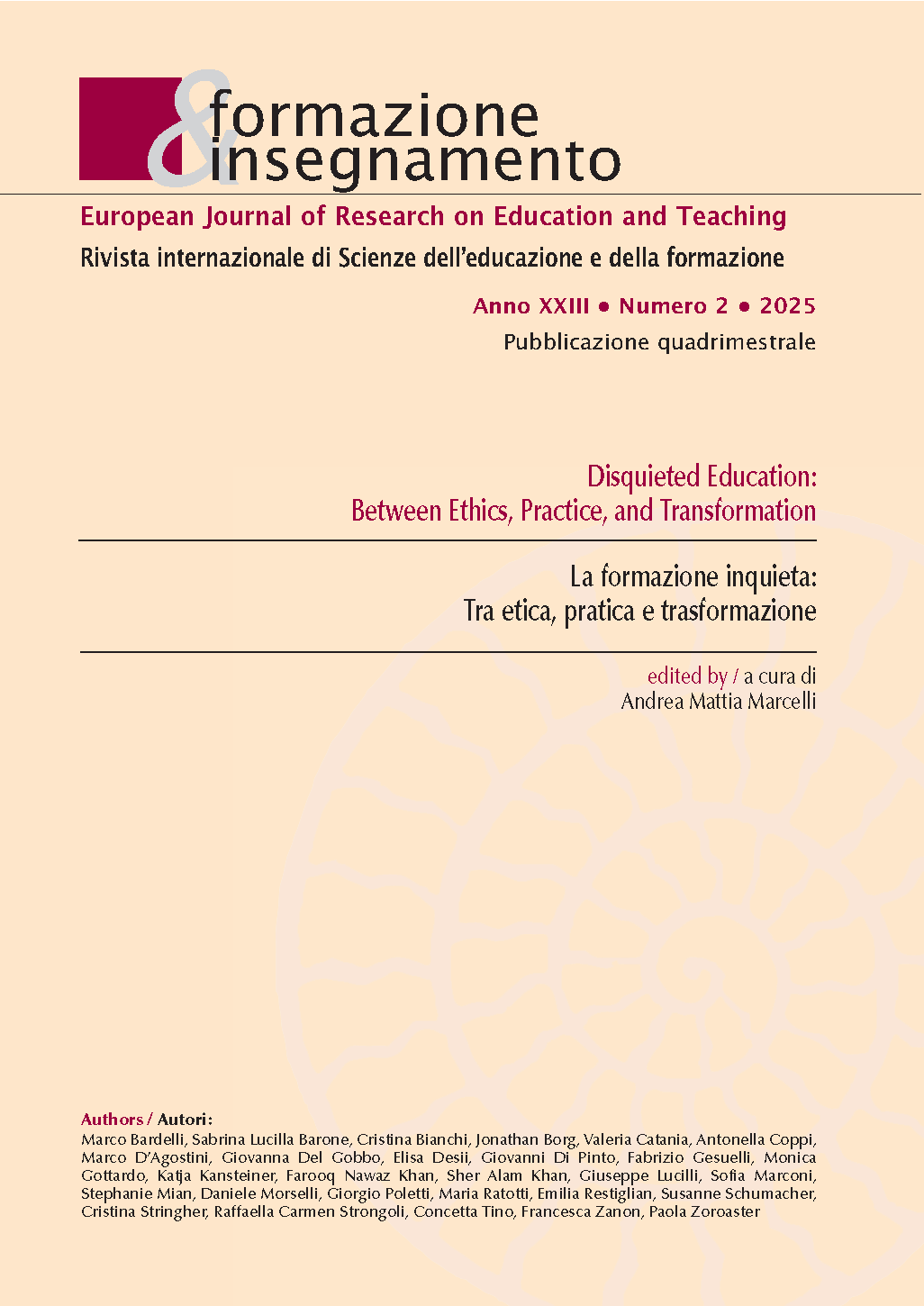Observing peer feedback in preschool
DOI:
https://doi.org/10.7346/-fei-XXIII-02-25_07Keywords:
Peer feedback, Kindergarten, Observation, Ethnographic researchAbstract
In the scientific literature of recent years, the topic of peer feedback in the educational field has been widely investigated, so much so that its role in the function of student learning, for example to promote self-assessment mechanisms, has been demonstrated in numerous studies. Although feedback is now considered a necessary and advantageous tool in school and university practice, there are still few studies that investigate its presence and value in nursery school. This article presents two ethnographic studies carried out in the Veneto Region and aimed at verifying the production of feedback among children aged 3, 4 and 5. Through an observation protocol, built specifically for the research, it was possible to confirm the significant presence of feedback also in this age group.
References
Altamura, A., Caso, R., & Disalvo, A. (2022). Observation in early childhood educational services: Epistemological paradigms, application methods and educative implications. Formazione & Insegnamento, 20(3), 175–189. https://doi.org/10.7346/fei-XX-03-22_14
Bach, K., & Harnish, R. M. (1979). Linguistic communication and speech acts. MIT Press. https://doi.org/10.2307/413908
Becker, G. S. (1964). Human capital: A theoretical and empirical analysis with special reference to education. University Press.
Bellotti, C. (2023). Apprendere in tutti gli spazi e tempi del vivere umano. Education Sciences & Society, 2, 219–227. https://doi.org/10.3280/ess2-2023oa16426
Benvenuto, G. (2013). Mettere i voti a scuola: Introduzione alla docimologia. Carocci.
Black, P., & Wiliam, D. (1998). Assessment and classroom learning. Assessment in Education: Principles, Policy & Practice, 5(1), 7–74. https://doi.org/10.1080/0969595980050102
Black, P., & Wiliam, D. (2009). Developing the theory of formative assessment. Educational Assessment, Evaluation and Accountability, 21(1), 5–31. https://doi.org/10.1007/s11092-008-9068-5
Castoldi, M. (2012). Valutare a scuola: Dagli apprendimenti alla valutazione di sistema. Carocci.
Elo, S., & Kyngäs, H. (2008). The qualitative content analysis process. Journal of Advanced Nursing, 62(1), 107–115. https://doi.org/10.1111/j.1365-2648.2007.04569.x
Galliani, L., & De Rossi, M. (Eds.). (2014). Videoricerca e documentazione narrativa nella ricerca pedagogica: Modelli e criteri. Pensa Multimedia.
Grion, V., & Serbati, A. (Eds.). (2018). Valutare l’apprendimento o valutare per l’apprendimento? Verso una cultura della valutazione sostenibile all’Università. Pensa MultiMedia.
Grion, V., Serbati, A., Doria, B., & Nicol, D. (2021). Ripensare il concetto di feedback: Il ruolo della comparazione nei processi di valutazione per l’apprendimento. Education Sciences & Society, 2, 205–220. https://doi.org/10.3280/ess2-2021oa12429
Grion, V., Serbati, A., Tino, C., & Nicol, D. (2018). Ripensare la teoria della valutazione e dell’apprendimento all’università: Un modello per implementare pratiche di peer review. Italian Journal of Educational Research, 19, 209–226. Retrieved May 30, 2025, from https://ojs.pensamultimedia.it/index.php/sird/article/view/2554
Hattie, J., & Clarke, S. (2018). Visible learning: Feedback (1st ed.). Routledge. https://doi.org/10.4324/9780429485480
Hattie, J., & Timperley, H. (2007). The power of feedback. Review of Educational Research, 77(1), 81–112. https://doi.org/10.3102/003465430298487
Heckman, J. J., & Raut, L. K. (2016). Intergenerational long-term effects of preschool: Structural estimates from a large, representative sample. Journal of Econometrics, 191(1), 159–174. https://doi.org/10.1016/j.jeconom.2015.10.001
Hsieh, H. F., & Shannon, S. E. (2005). Three approaches to qualitative content analysis. Qualitative Health Research, 15(9), 1277–1288. https://doi.org/10.1177/1049732305276687
Isaacs, J. B. (2008). Impacts of early childhood programs. First Focus and Brookings. Retrieved May 30, 2025, from https://citeseerx.ist.psu.edu/document?repid=rep1&type=pdf&doi=8890955844a5f71b2be11f36cce9c944de6f8362
Lave, J., & Wenger, E. (2006). L’apprendimento situato: Dall’osservazione alla partecipazione attiva nei contesti sociali. Erickson.
Leoncini, S. (2011). Etnografia in contesti scolastici: Prospettiva di ricerca tra antropologia e pedagogia. Focus sulla metodologia. Formazione & Insegnamento, 9, 231–238. https://doi.org/10.7346/fei-IX-04-11_22
Mantovani, S. (1998). La ricerca sul campo in educazione: I metodi qualitativi. Mondadori.
Morabito, C., & Vandenbroeck, M. (2020). Towards a child union! Reducing inequalities in the EU through investment in children’s early years. FEPS.
Nicol, D. (2010). From monologue to dialogue: Improving written feedback processes in mass higher education. Assessment & Evaluation in Higher Education, 35(5), 501–517. https://doi.org/10.1080/02602931003786559
Nigris, E., & Agrusti, G. (2021). Valutare per apprendere: La nuova valutazione descrittiva nella scuola primaria. Pearson.
Nigris, E., Balconi, B., & Zecca, L. (2019). Dalla progettazione alla valutazione didattica: Progettare, documentare, monitorare. Pearson.
O’Leary, M. (2020). Classroom observation: A guide to the effective observation of teaching and learning (2nd ed.). Routledge. https://doi.org/10.4324/9781315630243
Papatheodorou, T., Luff, P., & Gill, J. (2011). Child observation for learning and research (1st ed.). Routledge. https://doi.org/10.4324/9781315834771
Pavanello, M. (2010). Fare antropologia: Metodi per la ricerca etnografica. Zanichelli.
Restiglian, E., & Grion, V. (2019). Valutazione e feedback fra pari nella scuola: Uno studio di caso nell’ambito del progetto GRiFoVA. Giornale Italiano della Ricerca Educativa, 12(Suppl.), 195–221. https://doi.org/10.7346/SIRD-1S2019-P195
Rogoff, B. (2003). The cultural nature of human development. Oxford University Press.
Rossi, P. G., Ranieri, M., Li, Y., & Perifanou, M. (2019). Interaction, feedback and active learning: Where we are and where we want to go. Form@re - Open Journal Per La Formazione in Rete, 19(3), 1–5. https://doi.org/10.13128/form-7696
Serbati, A., Grion, V., & Fanti, M. (2019). Caratteristiche del peer feedback e giudizio valutativo in un corso universitario blended. Italian Journal of Educational Research, 12, 115–137. https://doi.org/10.7346/SIRD-1S2019-P115
Spiller, D. (2012). Assessment matters: Self-assessment and peer assessment. The University of Waikato. Retrieved May 30, 2025, from http://ceidev.ust.hk/files/public/assessment_matters_self-assessment_peer_assessment.pdf
Topping, K. J. (2017). Peer assessment: Learning by judging and discussing the work of other learners. Interdisciplinary Education and Psychology, 1(1), 1–17. https://doi.org/10.31532/InterdiscipEducPsychol.1.1.007
Vaismoradi, M., Turunen, H., & Bondas, T. (2013). Content analysis and thematic analysis: Implications for conducting a qualitative descriptive study. Nursing and Health Sciences, 15(3), 398–405. https://doi.org/10.1111/nhs.12048
Vandenbroeck, M., Lenaerts, K., & Beblavy, M. (2018). Benefits of early childhood education and care and the conditions for obtaining them. Publications Office of the European Union. EENEE Analytical Report, 32. https://doi.org/10.2766/20810
Waldfogel, J. (2015). The role of pre-school in reducing inequality. IZA World of Labor. https://doi.org/10.15185/izawol.219
Downloads
Published
How to Cite
Issue
Section
Categories
License
Copyright (c) 2025 Paola Zoroaster, Emilia Restiglian

This work is licensed under a Creative Commons Attribution 4.0 International License.
Formazione & insegnamento is distributed under Attribution 4.0 International (CC BY 4.0).
For further details, please refer to our Repository & Archiving Policy, as well as our Copyright & Licensing Terms.





